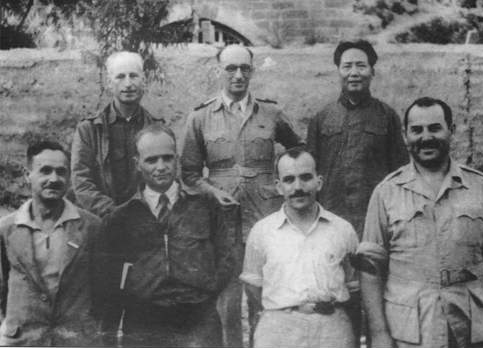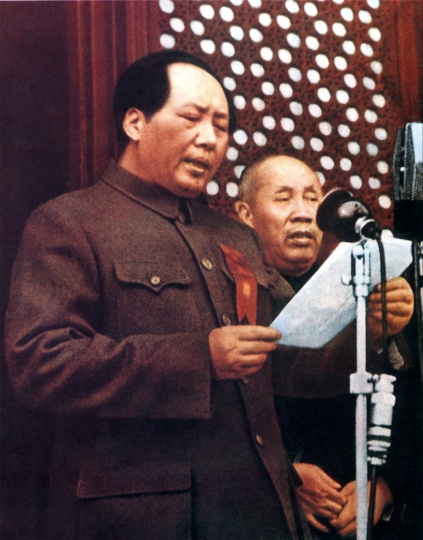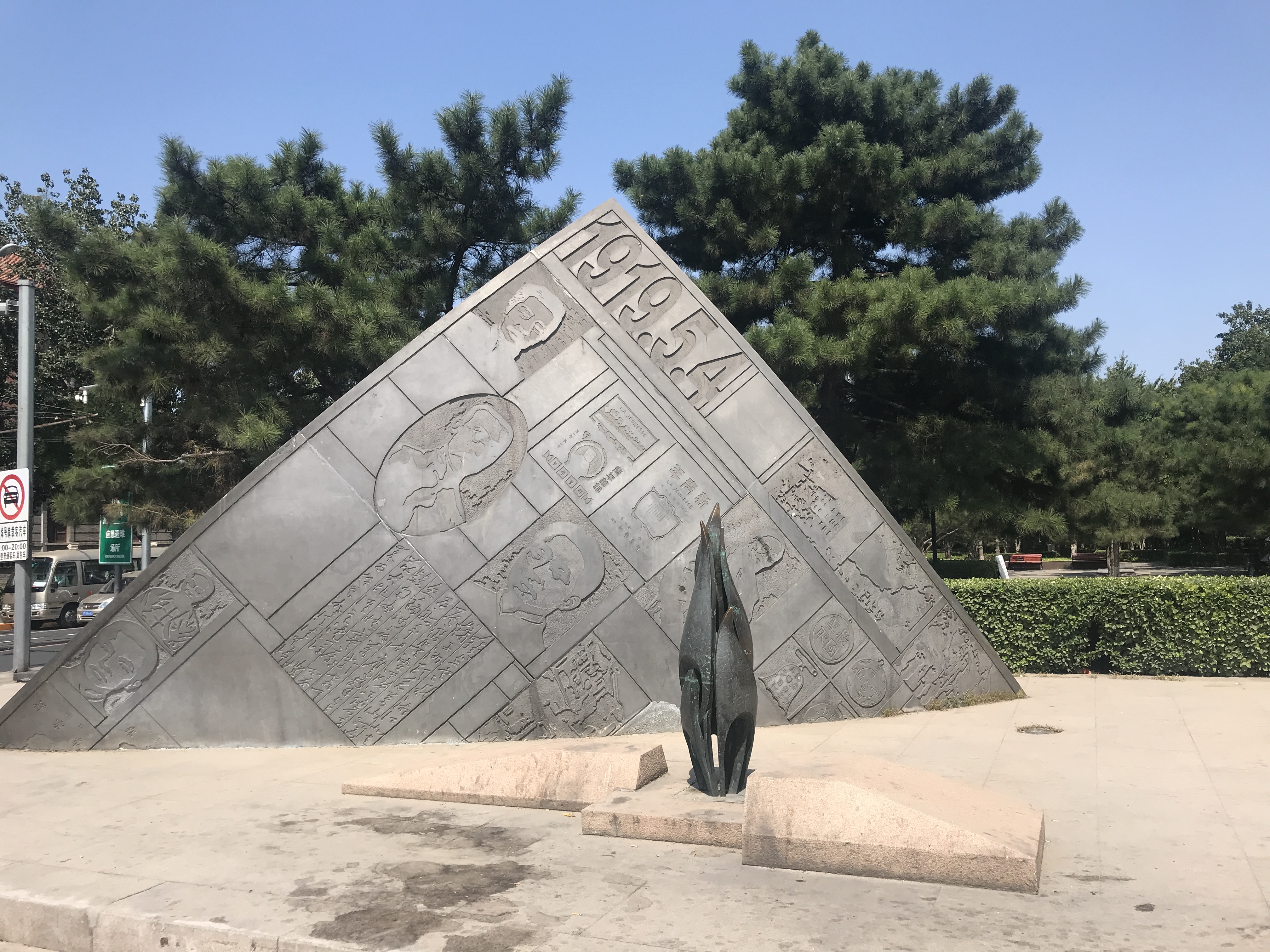|
Zhang Guotao
Zhang Guotao (November 26, 1897 – December 3, 1979) was a Chinese revolutionary who was a founding member of the Chinese Communist Party (CCP) and rival to Mao Zedong. During the 1920s he studied in the Soviet Union and became a key contact with the Comintern, organizing the CCP labor movement in the United Front with the Kuomintang. From 1931 to 1932, after the Party had been driven from the cities, Zhang was placed in charge of the Eyuwan Soviet. When his armies were driven from the region, he joined the Long March but lost a contentious struggle for party leadership to Mao Zedong. Zhang's armies then took a different route from Mao's and were badly beaten by local Muslim Ma clique forces in Gansu. When his depleted forces finally arrived to join Mao in Yan'an, Zhang continued his losing challenge to Mao, and left the party in 1938. Zhang eventually retired to Canada, in 1968. He became a Christian shortly before his death in Scarborough, Ontario (a suburb of Toronto), in ... [...More Info...] [...Related Items...] OR: [Wikipedia] [Google] [Baidu] |
Zhang (surname)
Zhang (; ) is the List of common Chinese surnames, third most common surname in China and Taiwan (commonly spelled as Chang in Taiwan), and it is one of the most common surnames in the world. It is spoken in the Chinese tones, first tone ''Zhāng''. It is a surname that exists in many languages and cultures, corresponding to the surname 'Archer' in English for example. In the Wade–Giles system of Romanization of Chinese, romanization, it is romanized as Chang, which is commonly used in Taiwan. Cheung is commonly used in Hong Kong as a romanization. It is the 24th name on the ''Hundred Family Surnames'' poem, contained in the verse 何呂施張 ''(Hé Lǚ Shī Zhāng)''. Zhang is also the pinyin romanization of the less-common surnames (''Zhāng''), which is the 40th name on the ''Hundred Family Surnames'' poem, and (''Zhǎng''). Today, it is one of the most common surnames in the world at over 100 million people worldwide. Zhang was listed by the People's Republic of China's ... [...More Info...] [...Related Items...] OR: [Wikipedia] [Google] [Baidu] |
Yan'an
Yan'an; ; Chinese postal romanization, alternatively spelled as Yenan is a prefecture-level city in the Shaanbei region of Shaanxi Province of China, province, China, bordering Shanxi to the east and Gansu to the west. It administers several counties, including Zhidan County, Zhidan (formerly Bao'an), which served as the headquarters of the Chinese Communist Party (CCP) before the city of Yan'an proper took that role. Yan'an was near the endpoint of the Long March, and became the center of the Chinese Communist Revolution from late 1935 to early 1947. Chinese communists celebrate Yan'an as the birthplace of the revolution. As of 2019, Yan'an has approximately 2,255,700 permanent residents. History Yan'an was populated at least as early as the Xia dynasty, when it formed part of . The area was not part of the subsequent Shang dynasty, and was instead inhabited by the Guifang, who fought against the Shang dynasty. The area was later inhabited by the Quanrong and the Xianyun dur ... [...More Info...] [...Related Items...] OR: [Wikipedia] [Google] [Baidu] |
Central Committee Of The Chinese Communist Party
The Central Committee of the Chinese Communist Party, officially the Central Committee of the Communist Party of China, is the Central committee, highest organ when the National Congress of the Chinese Communist Party, national congress is not in session and is tasked with carrying out congress resolutions, directing all party work, and representing the Chinese Communist Party (CCP) externally. It is currently composed of 205 full members and 171 alternate members (see 20th Central Committee of the Chinese Communist Party, list). Members are nominally elected once every five years by the National Congress of the Chinese Communist Party. In practice, the selection process is done privately, usually through consultation of the CCP's Politburo of the Chinese Communist Party, Politburo and its corresponding Politburo Standing Committee of the Chinese Communist Party, Standing Committee. The Central Committee is, formally, the "party's highest organ of authority" when the National C ... [...More Info...] [...Related Items...] OR: [Wikipedia] [Google] [Baidu] |
4th National Congress Of The Chinese Communist Party
The 4th National Congress of the Chinese Communist Party was held in the Shanghai International Settlement at a shikumen residence in No. 8, Lane 256, Dongbaoxing Road, between 11 and 22 January 1925. The congress was attended by 20 participants representing 994 party members of the Chinese Communist Party (CCP). The congress succeeded the 3rd National Congress of the Chinese Communist Party and preceded the 5th National Congress of the Chinese Communist Party. A congress report was drafted by Chen Duxiu who represented the 3rd Central Executive Committee of the Chinese Communist Party. Background Upon the formation of the First United Front between the Chinese Communist Party (CCP) in 1924, labour and peasant movements intensified throughout China, generating fears of revolution. Amidst rising tensions, the congress aimed to: * reflect the experiences gathered under the CCPKMT cooperation throughout 1924; * strengthen the leadership of revolutionary movements, and to; * ... [...More Info...] [...Related Items...] OR: [Wikipedia] [Google] [Baidu] |
Li Lisan
Li Lisan (; 18 November 1899 – 22 June 1967) was a Chinese politician, member of the Politburo, and later a member of the Central Committee. Early years Li was born in Liling, Hunan province in China in 1899, under the name of Li Rongzhi. His father, a teacher, taught Li Chinese traditional poems and classics. In 1915, he arrived at Changsha for high school and saw an advertisement in a newspaper written by a student from First Normal School of Changsha with the pen name 28 Strokes. Li met and then became friends with the young man, whose real name was Mao Zedong. Later, Li joined the army of a local warlord in Hunan. One of the Division Commanders, Cheng Qian, who was both Li's father's townsman and alumni, sponsored Li to study in Beijing. Beginning career France When Li reached Beijing, he applied to study in France and arrived there in 1920. He worked part-time as an assistant to a boilermaker to earn his tuition. His boss was a member of Communist Party and Li w ... [...More Info...] [...Related Items...] OR: [Wikipedia] [Google] [Baidu] |
Liu Shaoqi
Liu Shaoqi ( ; 24 November 189812 November 1969) was a Chinese revolutionary and politician. He was the chairman of the Standing Committee of the National People's Congress from 1954 to 1959, first-ranking Vice Chairman of the Chinese Communist Party, vice chairman of the Chinese Communist Party from 1956 to 1966, and the President of the People's Republic of China, chairman of the People's Republic of China (president of China) from 1959 to 1968. He was considered to be a possible successor to Chairman of the Chinese Communist Party, Chairman Mao Zedong, but was purged during the Cultural Revolution. In his early years, Liu participated in labor movements in strikes, including the May Thirtieth Movement. After the Chinese Civil War began in 1927, he was assigned by the CCP to work in Shanghai and Northeast China, and travelled to the Jiangxi Soviet in 1932. He participated in the Long March, and was appointed as the Party Secretary in North China in 1936 to lead anti-Japanese ... [...More Info...] [...Related Items...] OR: [Wikipedia] [Google] [Baidu] |
1st National Congress Of The Chinese Communist Party
The 1st National Congress of the Chinese Communist Party was held in Shanghai and Jiaxing between July 23 and August 2, 1921. The Congress established the Chinese Communist Party (CCP). The congress began in a ''shikumen'' building of the French Concession area of Shanghai (near present-day Xintiandi in Huangpu District, Shanghai, Huangpu District). In early June 1921, Dutch national Henk Sneevliet, also known as Ma Lin, a representative of Comintern, arrived in Shanghai, and urged various Communist cells in the country to get together for a national-level meeting. Russian Comintern representative also attended the meeting. At the time, there were 57 members of the CCP. Notably, the two founders of the party did not attend the congress: Chen Duxiu and Li Dazhao. The meeting was put to an end due to harassment from the French Concession police on July 30. The delegates then agreed to move the meeting to a rented tourist boat on South Lake (Jiaxing), South Lake in Jiaxing. The C ... [...More Info...] [...Related Items...] OR: [Wikipedia] [Google] [Baidu] |
Cadre (politics)
In political contexts, a cadre (, , ) consists of persons who function as leaders within a political organization. In some socialist states, a cadre is a group of people trained to carry out the goals of the party-state and to disseminate and enforce official ideology. These groups aim to stimulate loyalty by mobilizing citizens and by encouraging ideological and policy consensus. Cadres can be deployed in the field or employed in central offices by a political party, by the state, or by the secret police. They are often formed in order to break apart existing class hierarchies among citizens of a party-state. Such cadres have operated in a number of different countries: for example in the Soviet Union (1922 to 1991) and in Ethiopia during the Derg (1974 to 1987). the People's Republic of China maintains a cadre system. Cadre political parties Byrd and Bradbury analyse the origins of cadre political parties within Western democracies: Party organization in Western democra ... [...More Info...] [...Related Items...] OR: [Wikipedia] [Google] [Baidu] |
National Congress Of The Chinese Communist Party
The National Congress of the Chinese Communist Party (; ) is a party congress that is held every five years. The National Congress is formally the highest body within the Chinese Communist Party (CCP). Since 1987 the National Congress has been held in the months of October or November. The venue for the event, beginning in 1956, is the Great Hall of the People in Beijing. The Congress is the public venue for top-level leadership changes in the CCP and the formal event for changes to its constitution. In the past two decades the National Congress of the CCP has been pivotal at least as a symbolic part of leadership changes, and therefore has gained international media attention. The Congress formally approves the membership of the Central Committee, a body composed of the top decision-makers in the party, state, and society. In practice, however, only slightly more candidates than open seats are nominated for the Central Committee, limiting the Congress's role in the selec ... [...More Info...] [...Related Items...] OR: [Wikipedia] [Google] [Baidu] |
Toronto Star
The ''Toronto Star'' is a Canadian English-language broadsheet daily newspaper. It is owned by Toronto Star Newspapers Limited, a subsidiary of Torstar Corporation and part of Torstar's Daily News Brands (Torstar), Daily News Brands division. The newspaper was established in 1892 as the ''Evening Star'' and was later renamed the ''Toronto Daily Star'' in 1900, under Joseph E. Atkinson. Atkinson was a major influence in shaping the editorial stance of the paper, with the paper reflecting his principles until his death in 1948. His son-in-law, Harry C. Hindmarsh, shared those principles as the paper's longtime managing editor while also helping to build circulation with sensational stories, bold headlines and dramatic photos. The paper was renamed the ''Toronto Star'' in 1971 and introduced a Sunday edition in 1977. History The ''Star'' was created in 1892 by striking ''Toronto News'' printers and writers, led by future mayor of Toronto and social reformer Horatio Clarence Hocke ... [...More Info...] [...Related Items...] OR: [Wikipedia] [Google] [Baidu] |
May Fourth Movement
The May Fourth Movement was a Chinese cultural and anti-imperialist political movement which grew out of student protests in Beijing on May 4, 1919. Students gathered in front of Tiananmen to protest the Chinese government's weak response to the Treaty of Versailles decision to allow the Empire of Japan to retain territories in Shandong that had been surrendered by the German Empire after the Siege of Tsingtao in 1914. The demonstrations sparked nationwide protests and spurred an upsurge in Chinese nationalism, a shift towards political mobilization, away from cultural activities, and a move towards a populist base, away from traditional intellectual and political elites. The May Fourth demonstrations marked a turning point in a broader anti-traditional New Culture Movement (1915–1921) that sought to replace traditional Confucian values and was itself a continuation of late Qing reforms. Even after 1919, these educated "new youths" still defined their role with a tradi ... [...More Info...] [...Related Items...] OR: [Wikipedia] [Google] [Baidu] |
Peking University
Peking University (PKU) is a Public university, public Types of universities and colleges in China#By designated academic emphasis, university in Haidian, Beijing, China. It is affiliated with and funded by the Ministry of Education of the People's Republic of China, Ministry of Education of China. The university is part of Project 211, Project 985, and the Double First-Class Construction. It is also a member in the C9 League. Established as the Imperial University of Peking in 1898 by a royal charter from the Guangxu Emperor, it is the second oldest university in China after Tianjin University (established in 1895). In May 1912, the government of the Republic of China ordered the Imperial University of Peking to be renamed Peking University. Then Peking University merged with Yenching University during the nationwide restructuring of universities and academic departments in 1952. In April 2000, the Beijing Medical University merged with the Peking University. Peking Universit ... [...More Info...] [...Related Items...] OR: [Wikipedia] [Google] [Baidu] |





